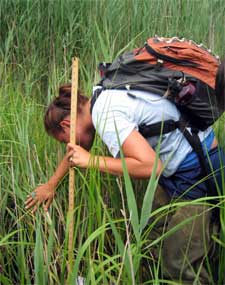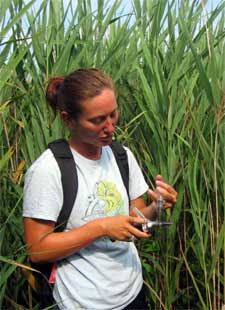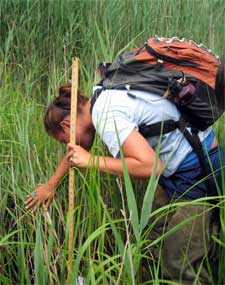 Winthrop, Mass. resident’s next step is medical school
Winthrop, Mass. resident’s next step is medical school
KINGSTON, R.I. – January 9, 2008 – University of Rhode Island senior Rebecca Allen spent much of the last six months gazing beneath marina docks at the scrambled mass of marine life hanging on their support structures.
The Winthrop, Mass. resident’s research project, in collaboration with the Providence-based environmental group Save the Bay, was aimed at determining the variety and abundance of invasive species that have moved into Narragansett Bay.
“Our objective was to see what new and potentially harmful species might be showing up in the Bay,” Allen explained. “These non-native species could be taking over the habitats of native species and offsetting the natural balance in the Bay. The project was the first step in determining what is here and where they are coming from so we can eventually do something about them.”
Most marine invasive species arrive in the ballast water of ships, which may take on ballast water in one part of the world and discharge it in another.
 Allen and fellow student researcher Michele Labas, under the supervision of URI graduate student Marci Cole, made multiple visits to 11 marina docks at scattered locations throughout Narragansett Bay as a follow-up to a Rapid Assessment Survey conducted at the same locations in 2000. While they didn’t find any previously undocumented invasive species on the docks, they did identify five non-native species, including an abundant brown algae, three types of tunicates – primitive marine organisms with saclike bodies enclosed in tough outer coverings — and an anemone.
Allen and fellow student researcher Michele Labas, under the supervision of URI graduate student Marci Cole, made multiple visits to 11 marina docks at scattered locations throughout Narragansett Bay as a follow-up to a Rapid Assessment Survey conducted at the same locations in 2000. While they didn’t find any previously undocumented invasive species on the docks, they did identify five non-native species, including an abundant brown algae, three types of tunicates – primitive marine organisms with saclike bodies enclosed in tough outer coverings — and an anemone.
One goal of the project was to determine if marina owners or other local residents could serve as monitors of marine invasive species in the Bay.
“I hadn’t taken any marine biology courses before, so in the beginning we had to look everything up in books or bring samples in baggies to be identified by Save the Bay staff,” said Allen, who graduated from Savio Prep School in East Boston in 2004. “But by the end, we knew all the scientific names and could identify everything pretty quickly. It showed that local residents could really do it.”
While conducting her invasive species research, Allen was also studying the suction and bite processing of spiny dogfish, a small species of shark. Both research projects were undertaken as part of the URI Coastal Fellows program, a unique initiative designed to involve undergraduate students in addressing current environmental problems. Now in its 13th year, the program based in URI’s College of the Environment and Life Sciences teams students with faculty, research staff and graduate students to help them gain skills that will ensure their future success.
As much as Allen enjoyed her environmental research this year, she will soon embark on a very different career path – medicine. She will begin preparing her medical school applications this winter, and she is deciding between schools in Massachusetts, California and Hawaii.
“I’ve always wanted to be a pediatrician,” Allen said. “And when I volunteered at Hasbro Children’s Hospital my sophomore year, I absolutely loved it. I can’t wait to get started.”

